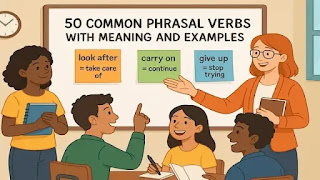What are the 50 Phrasal Verbs with Meaning and Examples?


The meaning of the
Adverb is Which Modifying the verb.Its primary function is to describe how, when, where, or to what extent an action is performed, or to provide further details about an adjective or another adverb.
Type of adverbs =
When? I will beat my wife ( tonight)
How much? He is (extremely) talented
Where? I come (here)
How often? I (never) tell a lie
How? I speak ( loudly)
Now we get to know the speciality of the verb. Adverbs are such words that can tell us inside any sentence what the
How much is it?
When? When is it happening
This is called adverb.
Adjective me Bas really, very tonight
this is added
but that is an adverb.
The work of an adverb is not just to tell the specialty of the verb
Its work is something else as well
Its job is to tell the speciality of the adjective also
Adverbs of Degree: These describe the extent or intensity of an action, adjective, or another adverb.
Interrogative Adverbs: These are used to ask questions about the manner, time, place, or reason of an action.
Relative Adverbs: These introduce relative clauses and provide information about time, place, or reason.
However, some adverbs do not follow this rule, such as:
Comments
Post a Comment
Please Don't Enter Any Spam Link In The Comment Box.